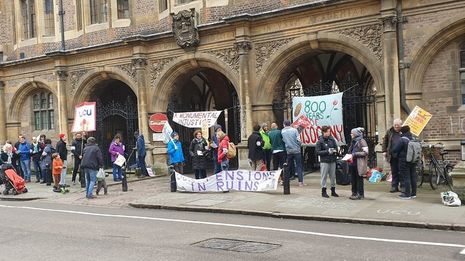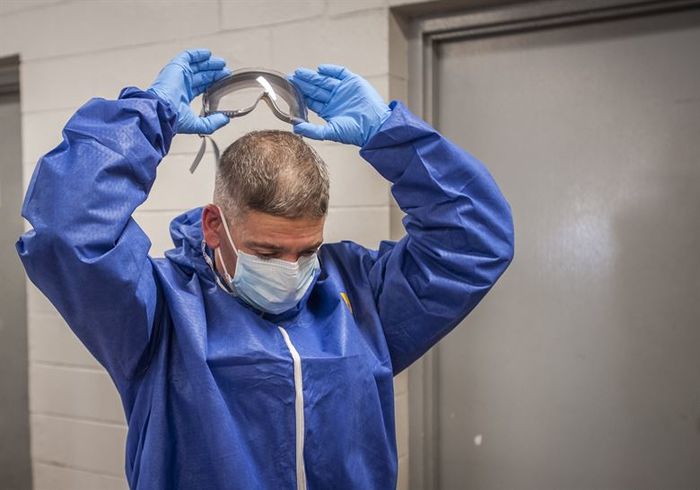‘Unpalatable’ financial measures taken by the university must not put workers at risk
Daisy Thomas and Scarlett Stevens respond to the Vice Chancellor’s recent email update regarding the university’s finances, arguing that decisions made in the wake of COVID-19 must prioritise low-paid University staff.

In his most recent email, Vice-Chancellor Stephen Toope wrote that ‘we must be prepared to contemplate some unpalatable options’ when considering the financial future of the University. In this, he listed potential ‘temporary pay freezes’, ‘voluntary pay reductions’ and that ‘in a worse-case scenario’ he would ‘contemplate potential generalised redundancies’. These ‘unpalatable’ decisions threaten to make University staff pay for the brunt of the financial damage inflicted by the COVID-19 crisis. The email speaks of a communal sacrifice that ‘we’ must make. In reality, the Vice-Chancellor himself would remain unaffected and already stretched workers would bear the brunt of his proposals.
Academics are already overworked and underpaid, and now face a complete upheaval of their usual teaching practices as teaching this term has moved online, with lectures forecast to remain remote next year. The University cannot remain the place of ‘education, learning and research’ that Toope described in his email if the academics are at risk of losing their jobs or their income. The introduction of these measures would serve to widen the already prominent wage gaps within the university, in which women, BME and disabled people are more likely to earn lower wages than their colleagues.
"We must look more broadly at management pay..."
Alongside that, there are low-paid staff across 23 colleges, as well as the central University, who are not being paid a Living Wage. The university, as an employer, must protect these workers, not cast them out during a time of economic distress. In Michaelmas and Lent terms, staff in UCU were forced to take strike action within the university, having also done so in 2018. The financial repercussions of the pandemic will give colleges and the University an excuse to silence these voices with the response that COVID-19 has made a living wage, equal pay and secure, fair pensions unachievable in the near future - when in reality, this is not the case. As pointed out in the recent UCU statement, staff wages and salaries account for just 31% of University expenditure.
The expected response to these ‘voluntary pay reductions’ is to ask that Stephen Toope lower his own salary, which is now at £475,000 a year, up £132,000 from 2017 - making him the fourth highest paid Vice-Chancellor in the UK. Although these are the right questions to be asking (Toope’s salary should certainly be called into question more than those of underpaid workers), a short term voluntary pay reduction from an already bloated salary would do little to mitigate the long term financial impact of COVID-19. We cannot allow the narrative of a singular pay reduction in a gesture of ‘good will’ to overshadow the University’s problem of pay inequality that reaches far beyond Toope himself.
"We cannot let already low-paid staff members suffer from the decisions of a few unaffected management personnel."
We must look more broadly at management pay, with eight management personnel (the Vice-Chancellor, the Pro-Vice-Chancellors, Chief Financial Officer and Registrary) earning over £2.1 million between them. As well as this, there are 347 staff members earning over £100,000 a year (compared to an average of 33 staff members across the sector) while the University cannot even secure the Living Wage Accreditation it promised in 2018. The gulf between highest and lowest paid workers is inexcusable and demonstrates the growing bureaucratisation of the University in which the combined cost of these 347 staff members equals just 6% of the total salary costs. The financial prioritisation of these select few staff members to such a high extent is indicative of the continued marketisation of higher education where unelected administrators outnumber and control the lives of academics, students and workers. Those that actually work to provide a functioning educational environment are treated as a lesser and, as can only be inferred from Toope’s email, expendable resource.
Rather than just pay reductions from these high-earning staff members, fair wage ratios need to be introduced to shrink the gap between high and low earners and reduce the competitive, business-like University model that fails to value education above profit. The mass wealth of our University must be fairly redistributed rather than hoarded by select members of management personnel. Only though long-term changes like this can we end the casualisation of labour and tackle the mechanisms underpinning it - changes which are now more necessary than ever.
As outlined in the demands of the Cambridge Living Wage Campaign, the University must “guarantee that no workers will be made redundant during or as a result of the pandemic period." There is no need for redundancies at all when the University has millions in reserves for times of crisis which current circumstances undoubtedly qualify for. The proposed £60 million loss represents barely 0.8% of the colleges’ net assets which were totalled at an overwhelming £7, 424, 334, 478 in 2019. The University cannot take advantage of this financial shift in order to widen gaps between high and low earners that unions such as UCU have spent the last 6 months fighting against.
When the University considers its ‘options’, it must look at who those decisions will be just ‘unpalatable’ for and who they will have an irreversibly detrimental effect upon. We cannot let already low-paid staff members suffer from the decisions of a few unaffected management personnel. The financial changes taking place give an opportunity to balance out the overwhelming pay inequalities in our University, not to widen gaps that academics have been struggling at the lower end of for years. Any coming changes must favour workers and shrink the rift that divides our University between bureaucratic managers and those who actually allow our educational environment to prosper.
 News / Uni Scout and Guide Club affirms trans inclusion 12 December 2025
News / Uni Scout and Guide Club affirms trans inclusion 12 December 2025 News / Pembroke to convert listed office building into accom9 December 2025
News / Pembroke to convert listed office building into accom9 December 2025 Features / Searching for community in queer Cambridge10 December 2025
Features / Searching for community in queer Cambridge10 December 2025 News / Uni redundancy consultation ‘falls short of legal duties’, unions say6 December 2025
News / Uni redundancy consultation ‘falls short of legal duties’, unions say6 December 2025 News / Gov declares £31m bus investment for Cambridge8 December 2025
News / Gov declares £31m bus investment for Cambridge8 December 2025









